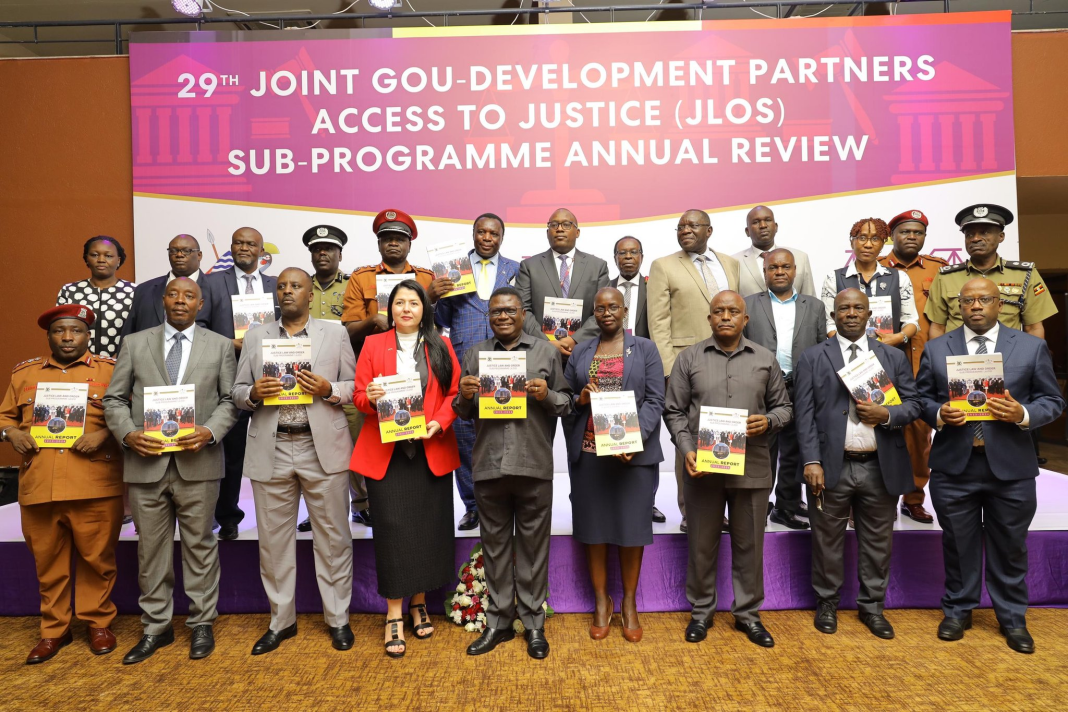Minister of State for Internal Affairs, Gen. David Muhoozi has revealed that the government is planning to address the challenges of high prison congestion and low staffing, stating that current levels exceed 300% of the designed capacity.
Muhoozi made the revelation during the launch of the 29th Annual Joint Government of Uganda and Partners Access to Justice Review at Speke Resort Munyonyo under the theme “Empowering the People, Building Trust, Upholding Rights”.
“To mitigate Uganda Prisons Services challenges, the Government Uganda plans to expand holding capacities to match inmate populations and focus on alternative inmate rehabilitation, feeding, and clothing strategies,” Muhoozi said.
He also emphasized on recruitment of more staff across the justice system to address understaffing and commitment to improving justice delivery, reducing crime, and addressing systemic challenges within the justice system.
He emphasized that the National Development Plan IV (NDP IV) would prioritize people-centered justice, economic growth, and social sector improvements.
According to Gen. Muhoozi, the Internal Affairs Ministry works closely with the National Planning Authority and institutional leaders to support initiatives that strengthen Uganda’s competitiveness for wealth creation, growth, and employment.
Muhoozi also stressed the importance of scientific crime management, emphasizing the role of forensic science in improving crime detection and investigation. Additionally, he highlighted initiatives like community policing, strengthening border controls, and offender rehabilitation to lower crime rates.
Gen. Muhoozi expressed optimism about the future of Uganda’s justice system under NDP IV, reiterating that addressing staffing gaps, improving prison conditions, and adopting modern crime management strategies would be key to achieving these goals.
During his keynote speech, Nobert Mao, Minister of Justice and Constitutional Affairs, emphasized the importance of access to justice as a pillar for a just and equitable society.
He highlighted the interconnectedness of various factors, including the rule of law, legal representation, increased security, and a corruption-free environment, to ensure that everyone has equal access to justice.
The Minister also stressed the need to protect human rights defenders and promote community service as essential components of a just society.
However, he acknowledged the persistent challenges facing the justice system, including a high case backlog and ongoing injustices.
Hon. Mao urged for concerted efforts to address these issues and ensure that everyone, regardless of their social or economic status, can access justice.
“The justice system’s core purpose is to fulfill the justice needs of the people. This subprogram continues to prioritize the demand side of justice in its planning and change management processes. Every effort is made to ensure that the demand side guides all change initiatives. Consequently, public trust in the justice system remains high compared to the NDPII period,” Mao said.
He added, “Efforts to maintain and elevate this trust are underway, including addressing service delivery timelines, expanding service points, ensuring consistent service delivery, enhancing customer care, and utilizing online services.”
The Annual Report also highlights key developments in Uganda Prisons Service, including the ongoing construction of a Staff Hospital in Luzira and plans for a regional Maximum-Security Prison. Human Resource Development efforts continue, along with improvements in prisoner and staff welfare, rehabilitation, and access to justice.
Additionally, UPS is enhancing institutional capacity through infrastructure development and expanded training programs, contributing to self-sufficiency and vocational skilling of inmates.








